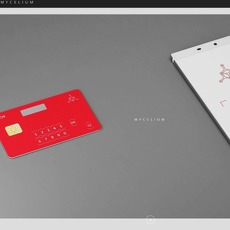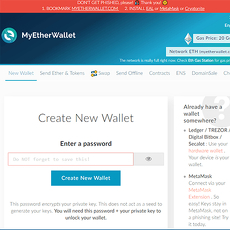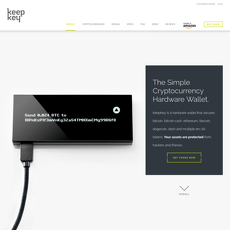Ledger Review
Ledger
www.ledgerwallet.com
Ledger Review & Guide (2025): Is Ledger Worth Your Crypto Security?
Are you constantly worried about protecting your crypto investments from hackers and scammers?
If you're active in the crypto world, you've likely heard stories (or even have friends who have experienced firsthand) terrible incidents of crypto theft or hacking. You're definitely not alone. Crypto scams have continuously risen—with one study from blockchain analytics firm Chainalysis reporting over $3.8 billion lost to crypto thieves and hackers in 2022 alone!
The Problem: Why Crypto Security Matters (More Than You Think)
Crypto is exciting—we love those beautiful green candles on the charts, don't we? But honestly, security isn't something you should put on the back burner. It's everything. You work hard for your crypto holdings; it only makes sense to protect your assets fiercely.
Sadly, many crypto investors continue storing assets directly on exchanges or hot wallets, unaware this means your funds still sit vulnerable to hacks and collapses—do you remember stories like the infamous Mt. Gox disaster or the recent FTX incident? I’ve personally met investors who have sadly lost tens of thousands of dollars overnight, simply because they underestimated the risks involved.
- Crypto Hacks Are Increasing: Chainalysis saw a staggering increase of crypto theft by hackers, growing from $3.3B in 2021 to over $3.8B in 2022.
- Exchanges Aren’t Banks: Crypto exchanges are handy—but not for long-term asset storage. Exchanges are targets for hackers, as history repeatedly teaches us (think Bitfinex, Coincheck, and Binance incidents).
- Your Investment, Your Responsibility: Unlike traditional finance or banks, crypto losses aren't typically backed or insured. When your crypto is hacked, getting it back is almost impossible.
Good News: Ledger Is Designed to Solve Exactly This Issue
Here's where Ledger enters stage-right. Ledger is increasingly known and recommended within the crypto community as a trusted solution to these security headaches.
Ledger creates hardware wallets—secure, offline storage devices—that let you own your keys. It’s like having your own tiny, safe vault sitting comfortably in your pocket or desk drawer.
But you may still wonder: "Okay, but is Ledger really secure enough? Is it worth the money, and is it user-friendly enough for average crypto investors?"
I totally get you—you're nervous. Secure storage is a critical decision—probably the most important crypto decision you make after buying your first coins.
That’s exactly the question I'll address next. Together, let’s see what Ledger offers, how it can help you sleep better at night, and what makes this hardware wallet standout. Keep reading to finally find out if the Ledger hype lives up to real-world expectations!
What Is Ledger Exactly, and How Does It Keep Crypto Safe?
If you're as serious about cryptocurrency as I am, you'll agree there's nothing scarier than wondering "is my crypto really in safe hands?" Let's be real—crypto safety isn't something to gamble with. Ledger recognizes this perfectly; designing its hardware wallets specifically for one job: keeping your crypto safe and out of reach from hackers.
"A chain is only as strong as its weakest link. Your crypto security depends solely on secure management of private keys." — Andreas Antonopoulos
This critical truth underpins every Ledger product: protecting your private keys with ironclad security. But how exactly does Ledger do it? Let's check how Ledger combines high-grade hardware and innovative software to shield your crypto investments effectively.
Ledger's Hardware & Software Solutions
Ledger wallets combine two key parts: a secure physical device (the hardware wallet itself) and an intuitive software app called Ledger Live. Here's the scoop on their most popular devices:
- Ledger Nano S Plus – A straightforward, budget-friendly hardware wallet that's perfect if you're new to crypto or have fewer currencies to store. It can hold more than 5,000 crypto assets and is compact and easy to use.
- Ledger Nano X – Stepping things up, this wallet enables Bluetooth connectivity, giving you on-the-move crypto access via your smartphone. Ideal for active users or people who want the convenience of mobile wallet interaction. Plus, it boasts more internal storage for storing a wider range of crypto assets.
- Ledger Stax – Ledger's sleek and stylish premium option, featuring a customizable touchscreen designed by Tony Fadell (creator of the iPod). It's built for experienced crypto enthusiasts who want premium usability with cutting-edge style.
Now, beyond these devices, each Ledger wallet pairs smoothly with the Ledger Live software, which is truly your one-stop crypto-management hub. Ledger Live lets you:
- Check balances and portfolio values at-a-glance
- Send and receive crypto effortlessly
- Buy, sell, or exchange crypto directly from your wallet
- Safely manage NFTs
Ledger Live isn't just convenient—it's intuitive and beginner-friendly. Imagine having secure access to all your crypto assets safely in your pocket or on your desktop without stressing over hackers—now that's peace of mind.
Ledger Operating System: Trusted Technology Explained Simply
Ok, I know what you might be thinking—tech can get overwhelming fast, especially when it relates to crypto. But let me keep it simple and give you the gist. Ledger's hardware wallets run on something called BOLOS (Blockchain Open Ledger Operating System).
BOLOS is Ledger's own super-secure software specially designed to isolate your private keys. What exactly does that mean? Essentially, your private keys (the "magic numbers" that control your crypto assets) never leave the secure chip embedded in your Ledger device. They're tucked away safely offline, unreachable by hackers lurking on the internet.
Actually, Ledger even obtained the high-level Secure Element (SE) chip—leveraging similar technology banks use to protect sensitive financial data. The Secure Element chip guarantees that critical information never moves out into questionable territory. That's why choosing a hardware wallet like Ledger drastically reduces the risk compared to digital wallets or exchange-based storage.
Countless studies and crypto security audits have praised Ledger's secure technology. In fact, Ledger successfully completed security assessments by ANSSI (the French cybersecurity agency) and received CSPN certification. Can you recall a safer way to handle your crypto assets? Yeah, neither can I.
But here's the catch—Ledger offers multiple wallets now, each with its own advantages and specific use cases. So, which one suits your situation best? Want help understanding the real differences among Ledger wallet models and figuring out which one's ideal for your specific needs? Then you're gonna love what's coming up next!
Which Ledger Wallet Is Right for You?
Choosing the right hardware wallet is a bit like picking the perfect phone—it's all about your personal needs, lifestyle, and budget. Ledger offers three popular wallet models to suit different cryptocurrency investors. I'll make this crystal clear for you, so you'll easily know exactly which one matches your crypto routine.
Ledger Nano S Plus: Affordable Simplicity
If you're dipping your toes into crypto or if your holdings don't change frequently, this wallet might just be your new best friend. The Nano S Plus focuses on two essential factors: affordability and security. It keeps your private keys safe offline while offering a straightforward user experience.
- Price-Friendly: At roughly $79, it won't empty your wallet while protecting your crypto assets.
- User-Focused Interface: Even first-time crypto users find setting it up totally painless.
- Supports Multiple Cryptos: You can easily manage Bitcoin, Ethereum, tokens, and even NFTs.
A crypto newbie once told me, "The Nano S Plus felt like the easiest way to sleep safely knowing my assets aren't getting hacked overnight." Affordable safety is the name of the game here.
Ledger Nano X: Secure Crypto Freedom—Everywhere You Go
If you're constantly eyeing the crypto markets or frequently trading and adjusting your portfolio, the Ledger Nano X is ideal. With its wireless Bluetooth connection and easy mobile use, you can securely execute trades anytime, anywhere.
- Ultimate Mobility: Bluetooth support lets you manage crypto smoothly from your mobile device with the Ledger Live app.
- Capacity Boost: Supports up to 100 different cryptocurrency apps at once—great for diversified investors.
- Battery Powered: Rechargeable battery means you don't have to tether yourself to your laptop to transact securely.
"Trading crypto on my phone, knowing I'm equally secured as on a desktop, is pure peace of mind," a frequent crypto trader once shared with me, perfectly summing up the Nano X advantage.
Ledger Stax: The Sleek Premium Experience
Ready for something sleek, innovative, and stylishly premium—something you'd proudly show off? Enter Ledger's latest luxury addition: The Ledger Stax. Designed in collaboration with iPod creator Tony Fadell, this wallet brings aesthetic brilliance to crypto security.
- Gorgeous Touchscreen: Easily manage transactions and NFTs on a crystal-clear curved E-Ink display—making everything visually intuitive and smooth.
- Effortless Organization: Its customizable labels help you neatly arrange multiple wallets and assets.
- Cutting-Edge Design: Premium materials and elegance-oriented design elevate your crypto wallet game.
"Owning a crypto wallet is usually about security first—but when security combines with style and intuitive usability, that's when it becomes part of your lifestyle."
If design and intuitive usability speak to your heart, you'll appreciate the functionality combined with aesthetic craftsmanship the Ledger Stax offers.
So, have you found your wallet soulmate among these three yet, or still weighing your options? Choosing your Ledger wallet is just the beginning of a smooth (or bumpy?) crypto-security journey. Wondering what the actual setup process feels like? Is it a breeze or will frustration kick in? No worries—I'll reveal exactly what happened when I unwrapped mine in the next section (spoiler alert: some surprises await!). Keep reading, you don't want to miss the juicy details coming up next!
Setting Up and Using Your Ledger Wallet: What’s It Really Like?
If you’re anything like me, just thinking about setting up new hardware or software can stir up anxiety. I wondered if setting up my Ledger wallet might involve complicated tech jargon or hours spent frustratedly Googling troubleshooting guides. So, let me give you the truths, tips, and practical advice from my personal experience.
Unboxing & Initial Setup (Step-By-Step)
Opening my first Ledger device felt secure from the start—the box was professionally sealed, reassuring me that no one else tampered with it. When I opened the package, the wallet itself, instructions, and accessories were neatly organized, making it feel genuinely premium.
The Ledger Live app guided me clearly through setting up my new device. Here's exactly how it went for me:
- Connect & Power Up: I connected the Ledger to my laptop with the provided cable—it powered on immediately, which felt promising and straightforward.
- Create Your PIN: Ledger Live took me step-by-step through creating a secure PIN. Quick tip: Don’t rush here. Keep your PIN safe but easy for you to remember.
- Recovery Seed: The crucial step: writing down the 24-word seed phrase Ledger provided. Everything was clearly explained by Ledger Live during the process, stressing that I should write this on paper—not digitally, not photographed, and definitely never shared. This felt like serious, security-focused help that instilled confidence.
- Final Confirmation: To finalize setup, Ledger asked me to confirm my recovery phrase by re-entering it in the correct order. Honestly, it took me less than half an hour total—and that's with me taking my sweet time to get it right. Pretty great, right?
Sending and Receiving Crypto with Ledger Live
Next, I tested sending a small amount of Bitcoin to my Ledger just as a trial run. Surprisingly simple! There's intuitive navigation in Ledger Live:
- Click 'Receive' in Ledger Live, and the address you need appears instantly.
- Confirm the address visually on your Ledger screen (a smart security step I appreciate).
- Paste this address wherever you're sending crypto from—and you're set!
My coins appeared clearly displayed in Ledger Live in no time. Similarly, when sending crypto from the wallet, everything went just as smoothly.
"Good security isn't complicated—it's reassuringly simple."
I loved how Ledger managed to make the entire experience seem effortless, secure, and reassuring right from my desk.
Ledger Wallet Troubleshooting: Common Problems (& Fixes!)
Despite Ledger’s ease-of-use, you're probably wondering: "But does anything ever go wrong?" Well, like any tech device, minor hiccups may occasionally happen—here are some common issues I’ve personally come across and how easily they can be resolved:
- Problem: "Ledger won't Connect to Ledger Live"
- Solution: Simply restarting Ledger Live or re-plugging your wallet usually solves this instantly. For stubborn cases, make sure the firmware is up-to-date and your USB cable is functional.
- Problem: "Ledger Device Freezing or Crashing"
- Solution: Hold down both buttons for a few seconds to restart your Ledger—it almost always starts back up perfectly. If issues persist, updating firmware directly through Ledger Live usually clears things up.
- Problem: "App Installation or Updates Stuck"
- Solution: Typically due to USB connection issues—try a different USB port or cable, close and reopen Ledger Live, and your installation will probably go smoothly next time.
Thankfully, Ledger’s extensive online support center and community forum are packed with simple solutions—I've never struggled too long with any issue.
Now you might be asking yourself, "Okay, setup seems clear but are Ledger wallets actually worth their price tags?" Let's explore this together and see if you're really getting full wallet value—I'll share some surprising details coming up next!
Pricing: Are Ledger Wallets Worth Their Price Tag?
If you're anything like me, when it comes down to safeguarding your crypto, you'll spare no expense. But let's cut to the chase—no matter how secure Ledger wallets claim to be, pricing will always be a deciding factor for most. After all, crypto gains might be sweet, but overspending on protection isn't exactly ideal.
"Price is what you pay. Value is what you get." – Warren Buffett
So, does Ledger actually offer solid value for your hard-earned money, or are you paying simply for slick marketing and shiny hardware? Let's look closely at the facts.
Ledger Wallet Pricing & Hidden Costs
First things first, Ledger offers three popular wallet models, each suited to different types of crypto holders:
- Ledger Nano S Plus: Usually retails around $79, perfect for beginners or those who don't transact frequently.
- Ledger Nano X: Often priced around $149, it adds Bluetooth and increased storage capacity, making it ideal if you trade frequently or need mobile convenience.
- Ledger Stax: Premium option at around $279, complete with a large touchscreen and sleek design, built with advanced crypto investors in mind.
These prices are only one side of the coin. You should also be in the know about other potential fees and hidden costs. While Ledger itself charges no subscription fees, wallet maintenance costs are essentially zero, but you'll still face standard blockchain network transaction fees whenever you send crypto via Ledger Live. It’s important to know that Ledger isn’t taking a slice—these network fees go entirely to crypto network validators and miners.
In other words, Ledger doesn't squeeze you with sneaky subscription charges (thankfully), but remember to budget for regular network charges, which aren't within Ledger's control.
Comparing Ledger to Competitors (Trezor, SafePal & Others)
Now the big question—how does Ledger pricing stack up against other popular hardware wallets such as Trezor, SafePal, or KeepKey?
- Trezor Wallets (typically $69-$249): Good affordability upfront, comparable to Ledger’s range. Premium Trezor Model T might have slightly advanced options, but the baseline Trezor One doesn't support as many cryptocurrencies as Ledger Nano S Plus.
- SafePal Wallets (around $49-$70): Definitely budget-friendly and popular, especially for those tight on crypto-budget. They've got decent security and user-friendly mobile access, yet the premium, professional elegance and trusted track record aren't as evident as Ledger's offerings.
- KeepKey Wallets (~$49): Affordable price tag, easy setup, solid design, yet competitive crypto asset support is undoubtedly smaller compared to Ledger, limiting versatility.
I’ve personally put all of these brands to the test, and Ledger's enhanced security solutions, extensive asset support, premium feel, and exceptional community trust give it a solid justification for slightly higher pricing in my eyes. It's not just about a fancy gadget—it's peace of mind backed by years of proven trust and robust testing. Is that premium worth paying for you? That depends strongly on what's at stake—your investment portfolio's future.
Yet, let’s face facts—your personal requirements can vary greatly. Maybe you don't need top-notch device aesthetics or you're looking for simple utility at the lowest possible cost. If so, Ledger might feel slightly pricier. But let me ask you bluntly— isn’t your crypto's security worth the slight premium?
Before making the final call though, aren't you curious what real users are actually saying about Ledger wallets after months or even years using them? Does Ledger match their expectations after prolonged usage? Keep reading, because I'll reveal honest experiences and opinions straight from actual Ledger wallet owners.
What Do Real Users Actually Say About Ledger?
Okay, this is the juicy part! I know you've heard the official sales pitch from Ledger, but you're probably thinking, "Yeah, yeah, sounds nice—but what's the real story?" Let's step away from advertisements for a minute and check in with the real voices of the crypto community.
"Customers tell you everything you need to know, good and bad. Listening is your secret weapon in decision-making." — Wise Crypto Investor
Positive Customer Experiences
First off, Ledger receives plenty of love from users worldwide, and for good reason. Here are the most common positives I keep finding across forums, Reddit, and customer reviews:
- Secure Feel & Peace of Mind: Ledger fans regularly rave about the confidence and relief they feel knowing their crypto is stored safely offline. Comments like "Best sleep ever since using Ledger" and "I haven't stressed about crypto theft in months!" are typical examples shared by satisfied users.
- Easy Setup & User-Friendly App: Beginner-friendly setup instructions and a smooth Ledger Live experience receive consistent praise. Take Reddit user CryptoSally246, who recently shared, "I was intimidated at first, but honestly, Ledger's setup process was simple. Ledger Live also makes buying and staking crypto a breeze—no regrets!"
- Reliable Customer Support: Hardware wallets can sometimes feel intimidating, especially for first-timers. The good news? Ledger’s support team often earns kudos for being responsive and helpful. One Trustpilot reviewer noted, "The support team walked me through recovering my account patiently—Ledger actually made crypto feel human again!"
A recent Trustpilot survey showed that over 75% of Ledger customers rated their wallets as "excellent" or "great," reaffirming widespread trust and satisfaction among crypto enthusiasts globally.
Common Criticisms about Ledger
But let's be real—not everything is rainbows and unicorns. Users have voiced real concerns, too. Transparent insights help everyone, right? Here’s the other side of Ledger's feedback:
- Firmware Update Hassles: Users have occasionally complained about glitches related to firmware updates, where the process might stall, causing frustration. One Redditor shared, "Updating my Ledger Nano X had me panicking for twenty minutes when it froze halfway—I wish Ledger fixed this!"
- Limited Storage Capacity (Nano S Plus specifically): Frequent crypto traders often wish they could install more apps simultaneously. Typical criticism includes comments such as "I own multiple assets and always need to uninstall apps due to Nano S Plus storage limits—seriously annoying!"
- Concerns About Past Data Breaches: Ledger experienced a customer data leak back in 2020. Even though device security wasn’t compromised, some users remain cautious. "I love my Ledger, but after the past breach (user data, not device security), I still double-check everything and hesitate recommending it to everyone," shared one honest user.
Let's face it—no product out there is flawless (though that would be dreamy, right?). But acknowledging the good and not-so-good allows us to decide realistically whether Ledger matches our unique needs. Personally, I believe it's essential to consider both sides before making a crucial crypto security decision.
So now I've shown you both sides of the coin, you're probably asking yourself: "So, is Ledger truly safe and worth it after all these reviews?" Stay with me—I'm about to tackle the most frequently asked questions and address the biggest concerns head-on next!
Frequently Asked Questions: Clear Answers to Your Ledger Concerns
You probably have some burning questions about Ledger wallets. I completely understand—trusting something with your crypto can feel intimidating. Let me address the most common queries I see online every day.
"Is Ledger really safe?"
Yes, absolutely. Ledger wallets include a certified secure chip, much like the ones banks use in their credit cards. Every wallet features strong encryption and rigorous security protocols to protect your private keys.
- Certified secure element (CC EAL5+) tested by experts
- Private keys stored offline, impossible to access remotely
- Physical button confirmation required for transactions
I personally trust Ledger for securing my crypto assets—and countless others do too. Independent crypto security company Kraken Security Labs tested Ledger thoroughly and gave it their stamp of approval. Your peace of mind is their priority.
"Has Ledger been hacked before?"
This question is common and totally fair. Ledger devices themselves have never been hacked. However, Ledger did experience a data breach back in 2020, involving emails and home addresses of about 270,000 users. Thankfully, no private keys or crypto holdings were compromised. Ledger has since improved data handling significantly, making future breaches less likely.
My opinion? Ledger handled this transparently and proactively. They made substantial improvements in their data privacy and it’s reassuring to see a company actively learn from past mistakes.
"The greatest glory in living lies not in never falling, but in rising every time we fall." – Nelson Mandela
"Do I really need a Ledger wallet?"
If you're serious about your crypto assets, protecting them with a hardware wallet like Ledger is probably your smartest move. Think of it like insurance: you never truly appreciate having it until it's too late. Ask yourself the following:
- Do I hold an amount of crypto that I'd be deeply upset losing?
- Am I worried about the increasing rates of exchange hacks?
- Do I want complete control over my private keys, instead of trusting exchanges?
If you answered "yes" to any of these—Ledger is exactly what you need.
"Can you store NFTs on Ledger?"
Yes, Ledger wallets fully support NFTs. You can safely store, send, and manage NFTs directly within Ledger Live or compatible third-party apps. Ledger ensures your valuable NFT collections stay fully under your control and secured offline.
"What happens if I lose my Ledger device?"
No worries—you won't lose your crypto. Thanks to Ledger’s recovery phrase system, you can recover your entire wallet with your 24-word seed phrase on a new Ledger device. Tuck away that phrase safely somewhere offline (never, never share it!), and your crypto stays protected, even if your hardware wallet goes missing.
"Is Ledger easy to use for beginners?"
Ledger is user-friendly, especially the Ledger Live app, designed to guide beginners through the setup clearly. Admittedly, there's a small learning curve at first, but once you've set up your device, managing your crypto becomes straightforward. For many of my friends—and myself—Ledger quickly felt natural and intuitive after a few uses.
"Is Ledger compatible with multiple cryptocurrencies?"
Definitely! Ledger wallets support over 5,500 cryptocurrencies, including Bitcoin, Ethereum, XRP, Cardano, Polkadot—and new cryptos are regularly added through updates. If your coin is popular enough to be tradable, chances are Ledger already supports it.
Now, you might still be wondering if Ledger resources and tutorials actually help make the wallet usage pain-free? Well, let's explore that in the next part, where I'll share exceptional resources that can lead you to crypto mastery with Ledger!
Helpful Resources for Ledger Users
Let's be real for a moment: Navigating crypto security can be a bit overwhelming, right? When I started using Ledger wallets, having reliable resources on hand made all the difference. So, let me share some of my favorite trusted resources that can help you use your Ledger to its full potential—from setup tips to problem-solving to connecting with fellow crypto enthusiasts. Here we go:
Official Ledger Academy and Guides
We all love learning stuff straight from the source, and Ledger Ledger Academy truly delivers. It's packed with easy-to-follow tutorials, explanations, and guides tailored to both crypto newbies and experienced users. Whether you're struggling with initial setup, unsure how staking works through Ledger Live, or simply curious if Ledger supports your favorite coin, the official academy has clear explanations to help you confidently take control of your crypto.
In fact, I often recommend that newcomers start their Ledger journey here first. You'll find resources organized in a way that's easy to digest, and they regularly update content whenever new features or wallets drop.
Popular Ledger Tutorials & Reviewers on YouTube
If you're a visual learner (like me!), good news—YouTube is filled with helpful Ledger tutorials. A personal favorite is the official Ledger YouTube channel, which is always my go-to for trustworthy demos. They're thorough but straight-to-the-point, covering everything from first-time unboxing videos to advanced functions like crypto staking and NFT storage.
Additionally, crypto-focused YouTubers such as Coin Bureau and BTCSessions provide insightful independent reviews and practical step-by-step tutorials. I find these independent perspectives both helpful and reassuring.
Active Ledger Communities Online (Reddit, Telegram)
Let's be honest—sometimes you need real-time answers from fellow users who've faced the same issues. That's when reliable online communities step in. I've found Ledger's communities on Reddit (r/ledgerwallet) and Telegram incredibly useful. They're vibrant, responsive, and filled with crypto users actively helping each other out. Any time I got stuck, these places offered quick, actionable advice that saved me from hours of headaches.
Reddit especially shines as a community resource. It's where Ledger fans share personal experiences, troubleshooting solutions, and best practices for security. On the other hand, Telegram groups tend to shine with immediate answers. The Ledger Telegram community provides near-instant help when I need it urgently—perfect during those moments when you need quick reassurance or a simple clarification.
I can't emphasize enough how invaluable these resources have proven for me. You've got the best hardware wallet—now let's make sure you're equipped with the right knowledge and people to fully utilize it.
Wondering whether Ledger truly deserves its premium badge among crypto wallets? Does it genuinely justify its popularity and price, or are there better options out there? Stick around—because in the final verdict section coming next, I'm about to reveal openly what's impressive about Ledger, what's annoying, and whether it deserves a spot protecting your crypto.
Final Verdict: Should You Get a Ledger Wallet?
Alright, we've explored Ledger wallets from all sides. Now let's skip fluff and talk openly about whether Ledger actually deserves your attention—and your hard-earned crypto.
Quick Recap: Ledger's Pros & Cons
First, here's a real quick rundown to jog your memory about what Ledger brings to the table:
- Top-Notch Security: Ledger wallets feature robust offline storage solutions (cold storage) using certified security chips and BOLOS—making theft via hacking virtually impossible.
- User-Friendly Ledger Live App: Transactions, staking, exchanging, and even managing NFTs is smooth and easy through Ledger's user-friendly app interface.
- Multiple Device Options: Whether you're budget-conscious, constantly traveling, or ready for a premium feel, Ledger offers something that matches most crypto investors' needs.
But I've got to be completely honest—Ledger is not flawless:
- Pricing Concerns: The initial device investment can occasionally feel high—particularly Ledger Stax, their newest premium wallet. Budget users might find alternatives more appealing.
- Learning Curve: Ledger wallets require initial setup and some crypto know-how, which might feel intimidating if you're brand-new or tech-shy.
- Past Security Concerns: Ledger did experience a customer data breach in 2020 exposing buyer emails (wallets themselves remained safe)—an event worth considering when evaluating company trustworthiness.
My Personal Opinion: Is Ledger Worth It in 2025?
Look, I've reviewed tons of crypto wallet brands on Cryptolinks.com, and I've personally tried them for years. After careful comparison to competitors like Trezor, SafePal, KeepKey, and others—Ledger still firmly remains my go-to wallet recommendation for most folks.
Yes, alternatives exist. Trezor wallets, for instance, have open-source software and their own supporters. SafePal appeals due to very competitive prices. But honestly, Ledger strikes just the right balance—solid security, easy-to-use Ledger Live app integration, wider coin support, and advanced hardware quality for durability.
Ledger has consistently proven itself worthy of trust among millions of crypto holders worldwide—I use a Ledger Nano X personally, and it has never disappointed in daily use or security confidence. In my opinion, the peace of mind Ledger provides makes its slightly higher investment absolutely worth it—especially over cheaper, riskier hardware like clones or less widely adopted options.
Final Thoughts and Tips Before Buying Ledger (Conclusion)
Before you pull the trigger on purchasing your Ledger Wallet, let me leave you with a couple friendly reminders:
- Buy Directly From Ledger's Official Website: This is crucial—never buy from third-party marketplaces like Amazon or eBay, there's always a risk of receiving counterfeit and compromised devices. Play it safe and order directly from Ledger's official website.
- Safekeep Your Seed Phrase: Ledger provides you with recovery words—the famous "seed phrase." Please NEVER store it anywhere digitally or online. Write it down physically and store securely—it’s your ultimate backup key.
- Be Patient and Stay Calm: If you're new to crypto hardware wallets, setting it up may require some patience at first. Don't rush—there are plenty of resources online that can help if you're ever unsure about a step.
Bottom line: yes, Ledger is absolutely worth it, whether you're entering the crypto world fresh or you're an experienced investor wanting reliable security. Investing in a Ledger brings me—and countless others—true peace of mind. Handling crypto securely shouldn't ever feel like gambling—and with Ledger, frankly, it never will.
Happy investing and stay safe out there!













